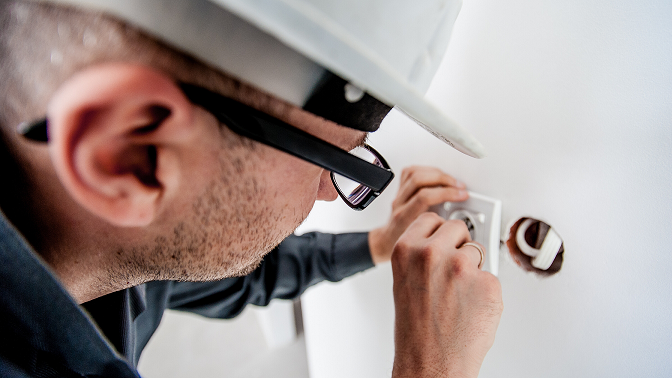The Government has now published the guidance for The Electrical Safety Standards in the Private Rented Sector (England) Regulations 2020.
Landlords will have to ensure every fixed electrical installation is inspected and tested before the tenancy begins, for all new private tenancies in England from 1st of July 2020 and existing tenancies from 1st of April 2021. As a landlord you will also need to make sure that the installation is tested and inspected at least every five years by a qualified person or more often, if the safety report states the requirement. The Regulations do not cover electrical appliances, only the fixed electrical installations.
Do the Electrical Safety Regulations apply to my rented properties?

Regulations apply, if a private tenant has a right to occupy a property as their only or main residence and pays rent, including assured shorthold tenancies and licences to occupy.
Information on exceptions can be found in the Schedule 1 of the Regulations and examples include social housing, lodgers, those on a long lease of 7 years or more, student halls of residence, hostels and refuges, care homes, hospitals and hospices.
Under the regulations, properties let on statutory periodic tenancies where the fixed term expires between July 2020 and April 2021 will also need an inspection and test.
Houses in Multiple Occupation (HMOs)

The regulations will apply to houses in multiple occupation (HMOs). The Management of Houses in Multiple Occupation (England) Regulations 2006 previously put specific duties on landlords around electrical safety. This requirement has now been repealed, and HMOs are now covered by the new Electrical Safety Regulations. There is a new mandatory condition in HMO licences ensuring that every electrical installation in the HMO is in proper working order and safe for continued use. See guidance on HMO licences.
What does a ‘qualified and competent person’ carrying out the test mean?

The Regulations require landlords to have the electrical installations in their properties inspected and tested by a person who is qualified and competent. The electrical safety industry produced a guidance, which covers how the landlord can choose a qualified and competent inspector and tester. This includes, but is not limited to:
In order to establish if a person is qualified and competent landlords can:
- check if the inspector is a member of a competent person scheme; or
- require the inspector to sign a checklist certifying their competence, containing their experience, whether they have adequate insurance and retain a qualification covering the current version of the Wiring Regulations and the periodic inspection, testing and certification of electrical installations.
The Electrical Safety Report
Landlords will have to provide a copy of the electrical safety report to their tenants, and to their local authority if requested.
Once the electrical installation has been tested, as a landlord of a private rented accommodation you must:
- Receive a report from the person conducting the inspection and test which provides the results and sets a date for the next inspection and test.
- Keep a copy of the report to give to the inspector and tester who will undertake the next inspection.
- Supply a copy of this report to the existing tenant living in the property within 28 days of the inspection and test.
- Supply a copy of this most recent report to a new tenant before they occupy the property.
- Supply a copy of the most recent report to any prospective tenant within 28 days of receiving a request for the report.
- If the local authority requests a copy of the report, you should supply it within seven days.
Remedial work
If the electrical safety report shows a fault or potential fault, which the landlord must either investigate further or repair, the landlord must ensure further investigations or repairs are completed by a qualified person within 28 days of the inspection, or within the timeframe set out in the report if this is shorter. If the report requires remedial work or further investigation, landlords must provide written confirmation that the work has been carried out to their tenant and to the local authority within 28 days of completing the work.
Breaching the regulations
If a landlord breaches the above requirements in the Regulations, the local authority has a reasonable duty to act. A remedial notice must be served by the local authority within 21 days on the landlord, requiring remedial action. The landlord will then have 28 days from the date of service of the notice to take the action outlined, or should make written representations within 21 days if they disagree with the notice. If the landlord has not carried out the remedial works, the local authority will be able to access the property with the tenants’ permission to remedy the issue. A notice must be served by the local authority to the landlord notifying them of this action – to which the landlord can appeal to the First-tier Tribunal. The costs for carrying out the remedial work can be recovered from the landlord.
If the tenants of the property deny access to the landlord for these remedial works, the landlord will not be in breach of their duty to comply with a remedial notice, if the landlord can show they have taken all reasonable steps to comply.
Penalties
Local authorities could impose a financial penalty of up to £30,000 on landlords who are in breach of the regulations and if there are multiple breaches, multiple penalties will be imposed.
Instruct Excel to manage your property to ensure you are compliant
At Excel, we offer full management of your property and can take the action necessary on your behalf to ensure you are fully compliant with The Electrical Safety Standards in the Private Rented Sector (England) Regulations 2020, as well as all other legal requirements relating to the renting of your property. If you are not already taking advantage of this service, please contact us today to discuss it in further detail with one of our Directors.
As our fully managed Landlords will know, we have been well ahead of this announcement and have been getting EICRs carried out on new properties for the last 18 months or so. Recently, we have also begun arranging EICRs for tenancies that renew from 1st July 2020 to ensure that they are fully compliant with the new legislation.
For more information on Electrical Safety Standards, please check the government guide: https://www.gov.uk/government/publications/electrical-safety-standards-in-the-private-rented-sector-guidance-for-landlords-tenants-and-local-authorities/guide-for-landlords-electrical-safety-standards-in-the-private-rented-sector
Make sure you are following us on all social platforms to get the latest news and updates.
Source: Guide for landlords: Electrical Safety Standards in the Private Rented Sector published by the Ministry of Housing, Communities and Local Government. © Crown copyright 2020.
